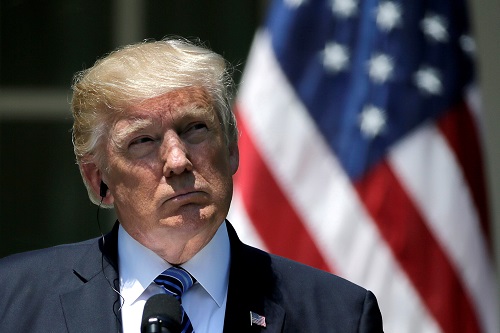Reuters photo
By
Tom Arms
Please, please, Mr. Trump, think twice before opening your mouth next week. Think again before opening your twitter account and a fourth time before turning away from the teleprompter to extemporaneously voice your thoughts.
Carefully consider all the options that Rex Tillerson says he has prepared for you. And think about what General Mattis told Congress about the wisdom of scrapping the Iran nuclear deal.
At stake is so much more than the appeasement of your political base and the fulfilment of a shoot-from-the-hip-vote-catching campaign promise.
Your decision will have repercussions on relations in the wider Middle East, with North Korea, Europe and America’s standing in just about every corner of the world.
Let’s start with the pressing problem of North Korea. You want – everyone wants – a deal which de-nuclearizes North Korea. But agreements involve at least two sides and requires both to stick to the deal and be known as the sort of government which keeps its promises.
Agreed, North Korea has a bad record in that department. But China doesn’t; and as you have repeatedly said: With China on your side, North Korea could be forced into keeping its part of the bargain.
Even the most vocal opponents of the Iran-nuclear deal reluctantly acknowledge that Tehran has kept to the letter of the agreement. If you break it then why should China or North Korea believe that you will keep your word in any arrangement with Pyongyang?
For that matter, why should Europe believe that you will keep your word as a member of NATO? Why should the South Koreans and Japanese sleep more soundly in their beds? Why should your hundreds of trading partners across the globe who help to keep hundreds of millions of Americans employed, clothed and fed believe that you will stick to any agreement.
Next there is the wider Middle East. Scrapping the Iran nuclear deal strengthens the position of the Iranian hardliners. President Hassan Rouhani has said he will stick to Iran’s side of the bargain regardless. But there are real doubts that he can hold back the fundamentalists who have a stranglehold on the military
If Iran develops nuclear weapons it will completely destroy the balance of power in the Middle East. Israel will feel more threatened. But so will Iraq, Saudi Arabia, the United Arab Emirates, Bahrain, Kuwait, Jordan, Lebanon, Syria and NATO ally Turkey. Do you respond to Iranian nuclear weapons by extending the US nuclear umbrella to those countries or feed the dangerous dragon of nuclear proliferation by giving them the technology to build their own weapons?
Over the past few weeks European ambassadors have been trooping in and out of the White House and the State Department urging you to renew the agreement with Iran. This is for several reasons. One is that Britain, France and Germany – along with Russia and China – are co-signatories to the Iran-nuclear deal. They have lifted sanctions and at great expense and effort have re-established political and trading links.
America is powerful enough to ignore the strongly held views of the co-signatories. But to do so would be to rub the noses of your allies in the unpalatable fact that their participation in the agreement is no more than diplomatic window-dressing.
President Rouhani has said that he expects Washington to scrap the deal. If it does he will simply carry on dealing with Europe, Russia and China without the US. This is partly because Iran needs the markets, goods and services which Europe provides.
But there is also a geopolitical reason. Throughout the Cold War, the Soviet Union tried to decouple the United States from Europe. Russia has inherited this policy. Iran and Russia are now political allies. A split between Europe and America over Iran would only serve Russia’s long-cherished ambitions and increase the political and military pressure that Moscow can exert on the rest of Europe.
You may not like to admit it, but you need Europe. It is more than your biggest trading partner. It is a crucial staging post that allows America to extend political influence in Europe, the Middle East and Africa. How much more difficult would it be to protect Israel or Saudi oilfields if you had to do so entirely from Norfolk, Virginia?
When presenting policy options to political masters, American diplomats generally present three choices: 1- Nuke ‘em, 2-Do nuthin’, 3-Something in between which the diplomat secretly desires. Please, go for number two.
Tom Arms is the editor of LookAheadnews.com. Sign up now for the weekly diary of world news events.
LookAhead Radio World Report for week commencing 9 October 2017:
Tom Arms
I am a journalist, entrepreneur and historian with extensive experience in print, web and broadcast journalism. I started as a diplomatic correspondent, wrote several books (The Falklands Crisis, World Elections On File and the Encyclopedia of the Cold War), and then in 1987 started my own business (Future Events News Service, www.fensinformation.com) which over 25 years established itself as the world and UK media’s diary. Our strapline was: “We set the world’s news agenda.” I sold FENS in December 2012 but retained the exclusive broadcast rights to all of FENS data. To exploit these rights I set up LookAhead TV which produces unique programmes which “Broadcasts Tomorrow Today” so that viewers can “Plan to Participate.” LookAhead has appeared regularly on Vox Africa, Radio Tatras International, The Conversation and Voice of Africa Radio.
In addition to being a syndicated broadcaster and columnist on global affairs, Tom is also available for speaking engagements and can be contacted on Twitter, Linkedin and email: [email protected].



No Comments Yet!
You can be first to comment this post!